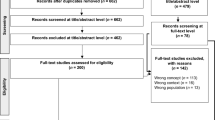Abstract
Adopting a systems-contextual perspective on implementation of evidence-based parenting programs highlights the wide variety of factors that influence program use in real-world settings. These factors are often identified through quantitative survey methods of facilitators and barriers to program use. What is more difficult to capture is the history of how program use unfolds over time and what variables influence the course of implementation in natural settings. In order to capture this perspective, a qualitative study was conducted with 69 community-based service providers who had been trained previously in an evidence-based parenting intervention (Triple P-Positive Parenting Program) but who were not receiving external implementation support outside of access to program materials for parents. Face to face interviews were conducted to capture the course of provider interaction with and use of the intervention from initial training to the time of the interview 2–3 years later. The qualitative analysis uncovered a variety of themes relevant to understanding the complex interplay of factors that impact program use. These themes provide a rich source of data for future directions in implementation research.
Similar content being viewed by others
References
Aarons, G. (2004). Mental health provider attitudes toward adoption of evidence-based practice: The evidence-based practice attitude scale (EBPAS). Mental Health Services Research, 6(2), 61–74.
Aarons, G., Cafri, G., Lugo, L., & Sawitzky, A. (2012). Expanding the domains of attitudes towards evidence-based practice: The evidence-based practice attitude scale-50. Administration and Policy in Mental Health and Mental Health Services Research, 39(5), 331–340.
Aarons, G., McDonald, E., Sheehan, A., & Walrath-Greene, C. (2007). Confirmatory factor analysis of the evidence-based practice attitude scale (EBPAS) in a geographically diverse sample of community mental health providers. Administration and Policy In Mental Health, 34, 465–469.
Aarons, G., & Sommerfeld, D. (2012). Leadership, innovation climate, and attitudes toward evidence-based practice during a statewide implementation. Journal of the American Academy of Child and Adolescent Psychiatry, 51(4), 423–431.
Beidas, R. S., & Kendall, P. C. (2010). Training therapists in evidence-based practice: A critical review of studies from a systems-contextual perspective. Clinical Psychology: Science and Practice, 17(1), 1–30.
Berkel, C., Mauricio, A., Schoenfelder, E., & Sandler, I. (2011). Putting the pieces together: An integrated model of program implementation. Prevention Science, 12, 23–33.
Breitkreuz, R., McConnell, D., Savage, A., & Hamilton, A. (2011). Integrating triple P into existing family support services: A case study on program implementation. Prevention Science, 12, 411–422.
Embry, D. D., & Biglan, A. (2008). Evidence-based kernels: Fundamental units of behavioral influence. Clinical Child and Family Psychology Review, 11(1), 75–113.
Fixsen, D. L., Naoom, S. F., Blase, K. A., Friedman, R. M., & Wallace, F. (2005). Implementation research: A synthesis of the literature. National Implementation Research Network. Tampa, FL: University of South Florida.
Greenhalgh, T., Robert, G., Macfarlane, F., Bate, P., & Kyriakidou, O. (2004). Diffusion of innovations in service organizations: Systematic review and recommendations. The Milbank Quarterly, 82(4), 581–629.
Kazdin, A. E. (2008). Evidence-based treatments and delivery of psychological services: Shifting our emphases to increase impact. Psychological Services, 5(3), 201–215.
Mazzuchelli, T., & Sanders, M. R. (2010). Facilitating practitioner flexibility within an empirically supported intervention: Lessons from a system of parenting support. Clinical Psychology: Science and Practice, 17(3), 238–252.
Moore, J. E., Bumbarger, B. K., & Cooper, B. R. (2013). Examining adaptations of evidence-based programs in natural contexts. Journal of Primary Prevention, 34, 147–161. doi:10.1007/s10935-013-0303-6.
Morawska, A., Haslam, D., Milne, D., & Sanders, M. R. (2011). Evaluation of a brief parenting discussion group for parents of young children. Journal of Developmental and Behavioral Pediatrics, 32(2), 136–145.
Prinz, R. J., Sanders, M. R., Shapiro, C. J., Whitaker, D. J., & Lutzker, J. R. (2009). Population-based prevention of child maltreatment: The US triple P system population trial. Prevention Science, 10(1), 1–12. doi:10.1007/S11121-009-0123-3.
Proctor, E., Silmere, H., Raghavan, R., Hovmand, P., Aarons, G., Bunger, A., et al. (2011). Outcomes for implementation research: Conceptual distinctions, measurement challenges, and research agenda. Administration and Policy In Mental Health, 38, 65–76.
Roach, A., Kratochwill, T., & Frank, J. (2009). School-based consultants as change facilitators: Adaptation of the concerns-based adoption model (CBAM) to support the implementation of research-based practices. Journal of Educational and Psychological Consultation, 19, 300–320.
Sanders, M. R. (2012). Development, evaluation, and multinational dissemination of the Triple P-Positive Parenting Program. Annual Review of Clinical Psychology, 8, 345–379.
Sanders, M. R., & Kirby, J. N. (2012). Consumer engagement and the development, evaluation, and dissemination of evidence-based parenting programs. Behavior Therapy, 43(2), 236–250.
Sanders, M. R., Kirby, J. N., Tellegen, C. L., & Day, J. J. (2013). Towards a public health approach to parenting support: A systematic review and meta-analysis of the Triple P-Positive Parenting Program. Manuscript under review.
Sanders, M. R., & Murphy-Brennan, M. (2010). Creating conditions for success beyond the professional training environment. Clincal Psychology: Science and Practice, 17(1), 31–35.
Sanders, M. R., Prinz, R. J., & Shapiro, C. J. (2009). Predicting utilization of evidence-based parenting interventions with organizational, service-provider, and client variables. Administration and Policy In Mental Health, 36, 133–143.
Shapiro, C. J., Prinz, R. J., & Sanders, M. R. (2010). Population-based provider engagement in delivery of evidence-based parenting interventions: Challenges and solutions. Journal of Primary Prevention, 31, 223–234.
Shapiro, C. J., Prinz, R. J., & Sanders, M. R. (2012). Facilitators and barriers to implementation of an evidence-based parenting intervention to prevent child maltreatment: the Triple P-Positive Parenting Program. [Research Support, U.S. Gov’t, P.H.S.]. Child Maltreatment, 17(1), 86–95. doi:10.1177/1077559511424774.
Turner, K. M. T., Nicholson, J. M., & Sanders, M. R. (2011). The role of practitioner self-efficacy, training, program and workplace factors on the implementation of an evidence-based parenting intervention in primary care. Journal of Primary Prevention, 32, 95–112.
Acknowledgments
This research was supported by Grants U17/CCU422317 and 1R18CE001340 to the second and third authors from the National Center for Injury Prevention and Control, Centers for Disease Control and Prevention. The findings and conclusions in this article are those of the authors and do not necessarily represent the views of the Centers for Disease Control and Prevention. The Triple P-Positive Parenting Program is owned by The University of Queensland, which has engaged Triple P International for technology transfer and dissemination. None of the authors has any share or ownership in Triple P International. C.S. is a consultant to Triple P America. R.P. is a consultant to Triple P International. M.S. is the founder and lead author for Triple P and a consultant to Triple P International.
Author information
Authors and Affiliations
Corresponding author
Rights and permissions
About this article
Cite this article
Shapiro, C.J., Prinz, R.J. & Sanders, M.R. Sustaining Use of an Evidence-Based Parenting Intervention: Practitioner Perspectives. J Child Fam Stud 24, 1615–1624 (2015). https://doi.org/10.1007/s10826-014-9965-9
Published:
Issue Date:
DOI: https://doi.org/10.1007/s10826-014-9965-9




